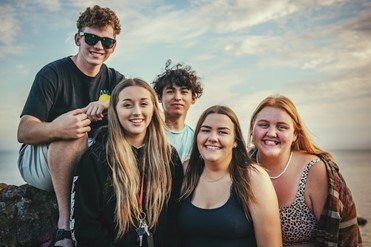The teenage years are a time for learning and discovery. It’s when children begin to come into their own, but more importantly, to learn how to flourish as a confident human.
Teenagers begin to truly value and understand an array of skills that likely have been shared with them at a young age. They start developing tangible financial and academic skills and navigate complex relationships with peers, teachers, siblings, and parents.

The teenage years are the most formative when it comes to social skills that will remain essential throughout one’s life — both in personal and professional matters. Teaching social skills can be challenging, but it can also be difficult for the person attempting to learn and understand them.
Eva Carlston Academy reports that social skills are among the most important lessons a teenager will ever receive. Here’s why:
It Imparts Communication Skills that Will Always Be Vital
For teenagers, social skills don’t just mean how to get along with people their own age. The lessons learned about language and interactions fuel the way they communicate with professors in college, co-workers, partners, and eventually their own children.
By teaching effective approaches to social interactions, teenagers are set on a path to interact properly with adults and then eventually become more socially responsible adults.
It Helps with Conflict Resolution
Proper social skills in teenagers lead to effective ways to navigate conflict resolution and make better decisions.
For young teenagers, that often comes in the form of peer pressure, whether that means how they treat others their own age or how they avoid situations such as bullying or alcohol/drug temptations.
With the right social skillset developed early, conflict resolution techniques are honed as well. And conflict resolution skills are always valuable.
It Helps Teenagers Gain Confidence and Self-Esteem
At its heart, low self-esteem primarily stems from the view that one isn’t good enough, that they are unlovable or inadequate. Instilling effective social skills early can reverse the epidemic of low self-esteem in teenagers which can lead to dangerous behavior.
Positive social skills including ways to take in and offer constructive criticism, communicate honestly, and be able to advocate for oneself and for others can have a lasting impact on how one feels about themselves for their entire life.

It Helps Develop Purpose-Driven Lives
Teens who develop social skills early are more likely to apply them to the good of the community.
That’s the awesome power of positive social skills. They not only make teens more effective people able to navigate the ups and downs of life but make them more successful citizens.
This comes in small forms, such as discerning the body language and social cues of others in order to form a proper response or larger forms such as helping teens understand the importance of volunteerism and giving back to the community.
Teens with social skills become adults who know how to compliment others, ask others for their opinion, and be empathetic. It helps them respect and honor others’ needs and make people feel welcome in situations that may be stressful and tense.
Good social skills lead to better cooperation, understanding, and affection while still being assertive and able to stick up for oneself.
Teens with good social skills become lifelong good listeners and helpers — and we always will need more of that in the world.



